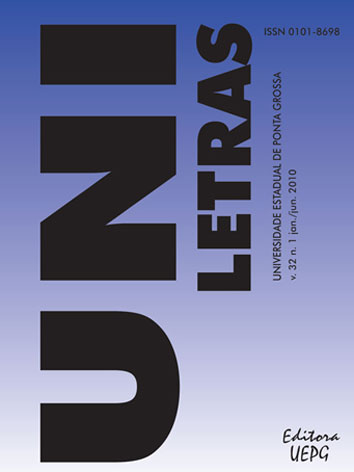Teoria da instrumentação e a formação inicial de professores de português. Doi: 10.5212/Uniletras.v.32i1.061076
DOI:
https://doi.org/10.5212/uniletras.v32i1.2528Palavras-chave:
Instrumentos, Formação docenteResumo
Resumo: A formação do professor caracteriza-se por ser uma atividade mediada por inúmeros instrumentos. Na perspectiva marxiana, todo trabalho se faz com o auxílio de instrumentos ou ferramentas, os quais sempre transformam o objeto sob o qual se aplicam, bem como os sujeitos que deles se utilizam. Por isso mesmo, seu papel na formação dos professores tem se tornado relevante e de necessária compreensão. O objetivo deste artigo é discutir o papel do instrumento a partir de três escopos teóricos, distintos, mas complementares: a Teoria Histórico-Cultural, a Ergonomia do Trabalho, de forma particular a teoria da instrumentação ampliada de Pierre Rabardel e a teoria do Interacionismo Sociodiscursivo em sua vertente mais didática. Os resultados dessa discussão apontam para a compreensão da importância da ferramenta na ação docente e para um conjunto múltiplo de ferramentas possíveis de serem utilizadas no processo de formação do professor.
Palavras-chave: Instrumentos; Formação docente.
Downloads
Downloads
Edição
Seção
Licença
Autores que publicam nesta revista concordam com os seguintes termos:
a) Os autores mantém os direitos autorais e concedem à revista o direito de primeira publicação, com o trabalho simultaneamente licenciado sob a Creative Commons Attribution License que permite o compartilhamento do trabalho com reconhecimento da sua autoria e publicação inicial nesta revista.
b) Esta revista oferece acesso livre imediato ao seu conteúdo, seguindo o princípio de que disponibilizar gratuitamente o conhecimento científico ao público proporciona maior democratização mundial do conhecimento. Para maiores informações sobre esta abordagem, visite Public Knowledge Project, projeto que desenvolveu este sistema para melhorar a qualidade acadêmica e pública da pesquisa, distribuindo o OJS assim como outros softwares de apoio ao sistema de publicação de acesso público a fontes acadêmicas. Os nomes e endereços de e-mail neste site serão usados exclusivamente para os propósitos da revista, não estando disponíveis para outros fins.

This work is licensed under a Creative Commons Attribution 4.0 International License.





